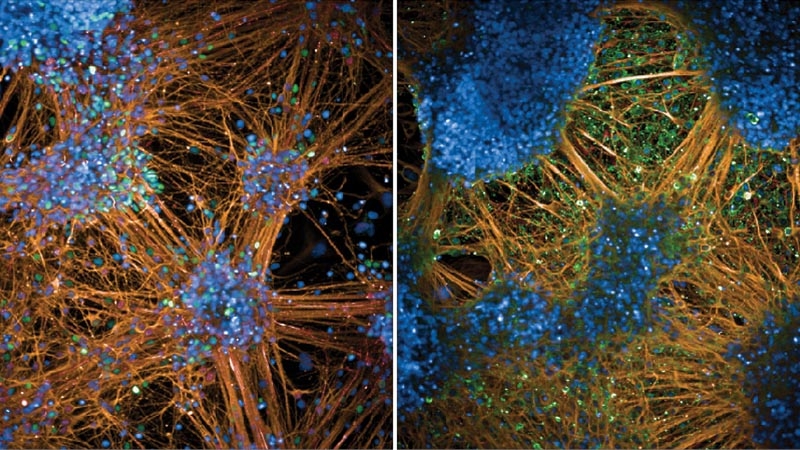Media releases announcing published research, priority events, signature initiatives and JAX's partnerships.
Settings
Save and close
Media releases announcing published research, priority events, signature initiatives and JAX's partnerships.
JAX researchers used mice with nine different genetic backgrounds to identify factors influencing eye aging, paving the way for eye-based diagnostics for neurodegenerative diseases
Learn more

Discovery could open door to game-changing RNA-based multi-cancer therapeutics.
View more
Scientists, patients, advocates, legislators, industry leaders and investors convened to highlight collaborative efforts and technological advances in rare disease research.
View more
The Jackson Laboratory and University of New England launch applied genomics course to advance personalized medicine.
View more
JAX researchers have uncovered how age-related cellular and molecular changes may contribute to breast cancer development.
View more
Healthcare leaders and executives in Maine selected to guide governor on AI innovation and workforce development.
View more
The Jackson Laboratory (JAX) achieved groundbreaking scientific milestones in 2024, securing record grant funding, publishing 385 research papers, and earning the highest-ever NCI rating for its Cancer Center. From genomic medicine to AI-driven discoveries, JAX continues to revolutionize biomedical research, drug discovery, and precision healthcare.
View more
Combining genetic therapy and bone marrow transplantation may offer comprehensive treatment solution for multiple sulfatase deficiency.
View more
Mice with a genetically pure background are susceptible to severe SARS-CoV-2 infection. Researchers at The Jackson Laboratory and Trudeau Institute have identified the first mouse strain that is susceptible to severe COVID-19 without the need for genetic modification.
View more
The Jackson Laboratory is a partner in two major projects funded by the Advanced Research Projects Agency for Health (ARPA-H), with a combined $60 million investment aimed at advancing biomedical research through data-driven approaches and AI.
View more
The AI-powered home-cage monitoring solution is poised to enhance preclinical research efficiency and improve the translation of findings to clinical settings.
View more
Researchers at The Jackson Laboratory have developed a new combination of imaging and computational methods to study connections between immune cells in breast cancer and melanoma.
View more
Researchers at The Jackson Laboratory (JAX), the Broad Institute of MIT and Harvard, and Yale University, have used artificial intelligence to design thousands of new DNA switches that can precisely control the expression of a gene in different cell types.
View more
Researchers at The Jackson Laboratory conduct pivotal study into aging and lifespan to uncover new details about how diets might make people live longer — but also their negative side effects.
View more
Some genetic factors predisposing people to diabetes might change the way pancreatic cells respond to molecular stress, researchers at The Jackson Laboratory discovered.
View more
The new funding will help support the first-of-its-kind single-cell mass spectrometer in Maine, and one of the first in the country.
View more
Through interactive, case-based lessons, the series empowers cardiology clinicians to move beyond a one-size-fits-all approach, enabling them to adopt more targeted management strategies for their patients.
View more
Dickinson among 502 Fellows honored for scientifically or socially distinguished efforts to advance science or its application at a ceremony in Washington, D.C.
View more
Unravel Biosciences and The Jackson Laboratory announce collaboration to accelerate the discovery of promising drugs for diseases with high unmet need.
View more
Diverse mouse models show promise in how we understand and treat diseases, offering a significant improvement over standardized but limited mouse and cellular models.
View more
This recognition by the Society is its highest honor in the academic fields of arts, social sciences, humanities and sciences.
View more
The Jackson Laboratory breakthrough could accelerate efforts to understand and treat dementia.
View more
The Jackson Laboratory has developed a computer vision-based method to accurately and continuously measure mouse body mass, offering a new resource for researchers that promises to enhance the quality of a wide range of preclinical studies.
View more
Research offers first ranking of relative role and significance of every known gene and protein in development of Alzheimer's.
View more
The role of gut-brain interaction in developing new alcohol use disorder treatments.
View more
Hematopoietic stem cells age differently in genetically identical mice, offering new pathways for interventions to preserve health with aging.
View more
Reengergizing exhausted T cells can kickstart immune system to fight cancer.
View more
Wild-derived mice could make it easier to draw conclusions about the effectiveness of new treatments or pharmaceuticals in humans.
View more
Partnership to expedite antibody discovery and derisk the development of vital new therapies.
View more
Dickinson's research background coupled with her successful executive leadership will help drive major initiatives and research priorities at a time of rapid growth.
View more
Maine cancer patients experienced better outcomes following genomic tumor testing to guide targeted therapy strategies; but a gap between testing and clinical delivery still exists.
View more
The funding will support construction of a dedicated facility for rare disease research, marking the first expansion of the Bar Harbor research footprint in seven years.
View more
A new protocol sets the stage for researchers to directly compare mouse and human cells to more closely approximate human health conditions.
View more